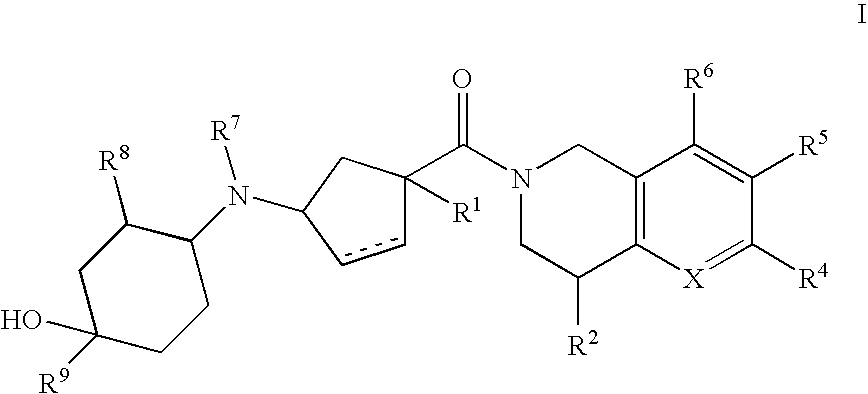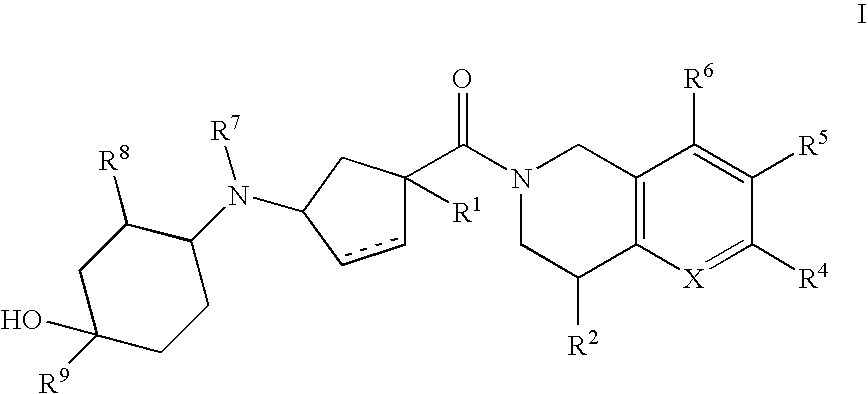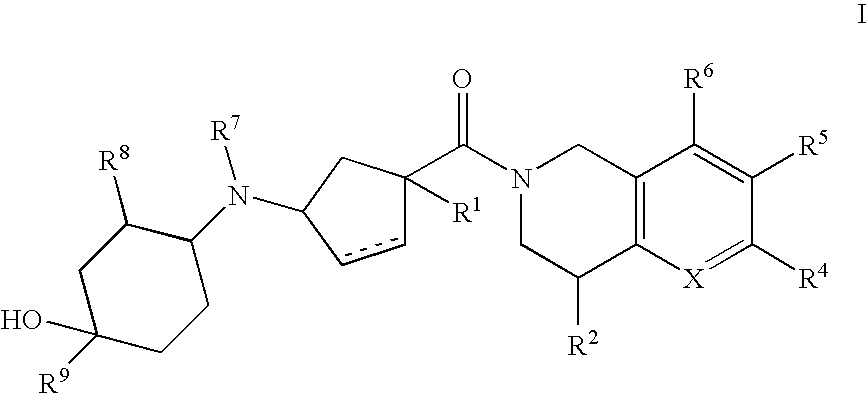3-(4-Heteroarylcyclohexylamino)cyclopentanecarboxamides as modulators of chemokine receptors
- Summary
- Abstract
- Description
- Claims
- Application Information
AI Technical Summary
Benefits of technology
Problems solved by technology
Method used
Image
Examples
example 1
4-[((1R,3S)-3-Isopropyl-3-{[7-(trifluoromethyl)-3,4-dihydroisoquinolin-2(1H)-yl] carbonyl}cyclopentyl)amino]-1-pyridin-2-ylcyclohexanol
[0163] Step A-1
Methyl (1R,4S)-4-[(tert-Butoxycarbonyl)amino]cyclopent-2-ene-1-carboxylate
[0164] To a solution of (1R,4S)-4-[(tert-butoxycarbonyl)amino]cyclopent-2-ene-1-carboxylic acid (10.0 g, 44 mmol) in DMF (25 mL) was added potassium carbonate (6.33 g, 45.8 mmol) followed by methyl iodide (4.0 mL, 64 mmol). After being stirred at room temperature overnight, the reaction mixture was diluted with EtOAc. The solution was washed with water four times and brine one time, dried (MgSO4) and concentrated. The residue was dried under high vacuum overnight to provide the title compound (11 g, 99%). MS calculated for C12H19NO4: (M+H)+242; found 142.1 (M−Boc+H)+. 1H NMR (CDCl3) δ 5.86 (m, 2H), 4.90 (m, 1H), 4.80 (m, 1H), 3.72 (s, 3H), 3.50 (m, 1H), 2.51 (m, 1H), 1.86 (m, 1H), 1.42 (s, 9H).
Step A-2
Methyl (1S,4S)-4-[(tert-Butoxycarbonyl)amino]-1-isopropy...
example 2
4-[((1R,3S)-3-Isopropyl-3-{[7-(trifluoromethyl)-3,4-dihydroisoquinolin-2(1H)-yl]carbonyl}cyclopentyl)amino]-1-(1,3-oxazol-2-yl)cyclohexanol
[0177] Step A
4-Hydroxy-4-(1,3-oxazol-2-yl)cyclohexanone
[0178] To a solution of 1,3-oxazole (2.0 mL, 30.41 mmol) in THF (20 mL) was added 1.0 M solution of borane in THF (30.4 mL) at room temperature. The mixture was stirred for 1 hour before being cooled down to −78° C. To the above solution was added a 1.6 M solution of n-butyllithium in hexane (19 mL). After stirring at −78° C. for one hour, a solution of 1,4-dioxa-spiro[4.5]decan-8-one (5.22 g, 33.45 mmol) in THF (10 mL) was added. After being stirred at −78° C. for 5 hours, the reaction was quenched by addition of a 3 M solution of HCl in water (40 mL). The resulting solution was stirred at room temperature overnight, neutralized with potassium carbonate and extracted with EtOAc three times. The combined extracts were dried over MgSO4 and concentrated. Purification by flash chromatography...
example 3
4-[((1R,3S)-3-Isopropyl-3-{[7-(trifluoromethyl)-3,4-dihydroisoquinolin-2(1H)-yl] carbonyl}cyclopentyl)amino]-1-pyrimidin-2-ylcyclohexanol
[0180] Step A
8-Pyrimidin-2-yl-1,4-dioxa-spiro[4.5]decan-8-ol
[0181] To a solution of 2-bromopyrimidine (0.20 g, 1.258 mmol) in dry methylene chloride (3.0 mL) was dropwise added 1.6 M of n-butyllithium in hexane (0.86 mL) at −78° C. The reaction mixture was stirred for 29 min at −78° C. and 1,4-dioxa-spiro[4.5]decan-8-one (0.196 g, 1.26 mmol) in CH2Cl2(3 mL) was added dropwise. The reaction was stirred at −78° C. for 50 min and quenched with an aqueous solution of NH4Cl. After being warmed to room temperature, the mixture was extracted with CH2Cl2 three times. The combined extracts were dried over MgSO4, filtered and concentrated in vacuo to provide 0.50 g of crude product. Purification by column chromatography on silica gel eluting with 0->50% EtOAc in hexanes provided 0.159 g (54%) of desired product as a light brown-yellow solid. MS (M+H)+237...
PUM
| Property | Measurement | Unit |
|---|---|---|
| Capacitance | aaaaa | aaaaa |
| Pharmaceutically acceptable | aaaaa | aaaaa |
Abstract
Description
Claims
Application Information
 Login to View More
Login to View More - R&D
- Intellectual Property
- Life Sciences
- Materials
- Tech Scout
- Unparalleled Data Quality
- Higher Quality Content
- 60% Fewer Hallucinations
Browse by: Latest US Patents, China's latest patents, Technical Efficacy Thesaurus, Application Domain, Technology Topic, Popular Technical Reports.
© 2025 PatSnap. All rights reserved.Legal|Privacy policy|Modern Slavery Act Transparency Statement|Sitemap|About US| Contact US: help@patsnap.com



